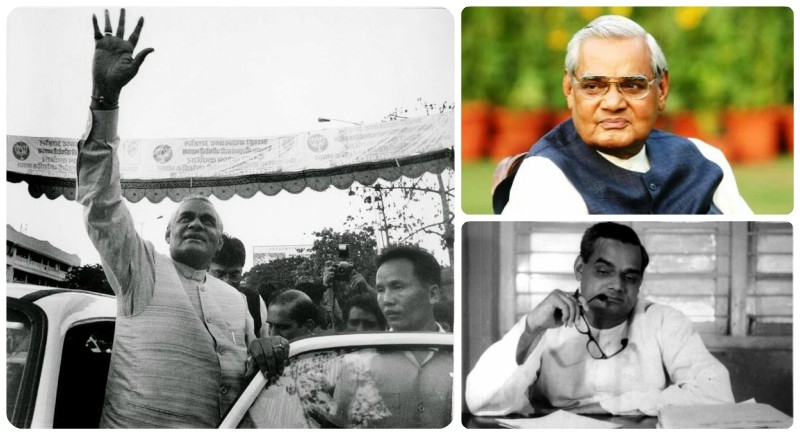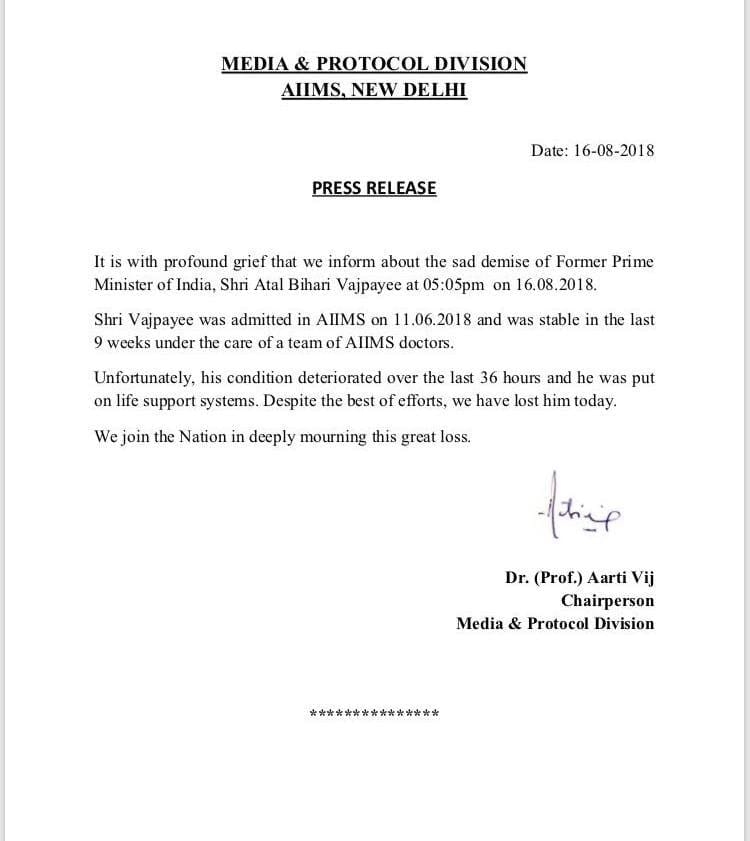With former PM Atal Bihari Vajpayee’s demise, Indian politics loses stalwart who was beyond politics and true shield of good governed secure India
New Delhi, August 16: One of the pillars of Indian political history and true leader of people who always thought for the nation and nothing else, such personality former Prime Minister Atal Bihari Vajpayee took his last breathe due to long ailment at AIIMS hospital today leaving a million eyes with tears. He was 93. his death was officially declared at 5.05 pm.

Since the morning the PM Modi’s two visits in 16 hours, a queue of many ministers, dignitaries to meet Atalji due to his critical condition worried the whole nation and million eyes were towards Delhi as to what will happen to their dear Ex-PM. In a press release by the hospital authorities, he was on life support system for the last couple of days. Vajpayee was admitted to the AIIMS in June this year for treatment because of lower respiratory tract infection and kidney issues and he was diagnosed with a urinary tract infection.
Life Sketch of the person who was India’s shield
Bharat Ratna Atal Bihari Vajpayee gave us the courage and valor to dream big as he initiated Pokhran II making India a nuclear country. He thrice served as the Prime Minister of our country.
He was a member of the Parliament for over four decades, being elected to the Lok Sabha ten times, and twice to the Rajya Sabha. He served as the Member of Parliament for Lucknow, Uttar Pradesh until 2009 when he retired from active politics due to health concerns.
Vajpayee was among the founding members of the Bharatiya Jana Sangh which he also headed from 1968 to 1972. He was the Minister of External Affairs in the cabinet of Prime Minister Morarji Desai.
And he was among the ones who restructured the Jana Sangh into the Bharatiya Janata Party in 1980. He was the first Indian prime minister not belonging to the Indian National Congress to serve a full five-year term.
He was conferred India's highest civilian honor, the Bharat Ratna in 2014. It was declared by the Modi government in 2014 that Vajpayee's birthday, 25 December, would be marked as Good Governance Day.
Right from Indian Airlines hijack in 1999, 2001 attack on Parliament, 2002 Gujarat violence Vajpayee government was capable to handle all the situations and tackled the moments of crisis.
Some of the achievements of Vajpayee government which is still an inspiration for other governments:
Pokhran II
India’s first official nuclear tests on 11 May 1998 caught the strategic community napping. Analysts in India and abroad assumed that once he assumes office, former Prime Minister Atal Bihari Vajpayee would not follow through on his long-articulated argument that India needed to develop nuclear weapons to guarantee security from adventuresome neighbours. They assumed that Vajpayee would hesitate since the world was not likely to take kindly to it.
But as Vajpayee formed his government in 1998, he took the first steps towards testing. In May 1998, India conducted five underground nuclear tests in Pokhran desert in Rajasthan, 24 yrs after India conducted its first nuclear test (Smiling Buddha) in 1974. This test is called Pokhran-II. The tests were held just a month after the government had been in power.
Under Pokhran-II, five underground nuclear bomb explosions took place on May 1998. The tests, which collectively were called Operation Shakti, were controversial and resulted in sanctions by the US and the European Union. The sanctions resulted in slightly declining foreign investment but largely failed to impede the economy.
The architect of three new states
Atal Bihari Vajpayee, during his government, created three new states that too very peacefully without any chaos they are Chhattisgarh, Jharkhand, and Uttaranchal (now known as Uttarakhand) in 2000. They were formed on the 1st, 9th, and 15th of November 2000, respectively. It changed the count of Indian states from 25 to 28.
Chhattisgarh reconstituted Madhya Pradesh; Uttaranchal reformed Uttar Pradesh; and Jharkhand was carved out of Bihar. The basis for the creation of these states was socio-political and not linguistic.
Kargil War, 1999
Militants and non-uniformed Pakistani soldiers had infiltrated into the Kashmir Valley and captured control of border hilltops, unmanned border posts and were spreading out fast. The incursion was centred around the town of Kargil, but also included the Batalik and Akhnoor sectors and artillery exchanges at the Siachen Glacier.
Indian army units were swiftly rushed into Kashmir in response. Operation Vijay, launched in June 1999, saw the Indian military fighting thousands of militants and soldiers in the midst of heavy artillery shelling and while facing extremely cold weather, snow and treacherous terrain at the high altitude.
India pushed back the Pakistani militants and Northern Light Infantry soldiers. Almost 70% of the territory was recaptured by India. Vajpayee sent a "secret letter" to US President Bill Clinton that if Pakistani infiltrators did not withdraw from the Indian territory, “we will get them out, one way or the other” - meaning he did not rule out crossing the Line of Control (LoC), or was the use of nuclear weapons.
After Pakistan suffered heavy losses, Nawaz Sharif asked the remaining militants to stop and withdraw to positions along the LoC.
The victory in Kargil bolstered the image of Vajpayee and he was hailed across the country for his bold and strong leadership. On 26 July 2012, designated as 'Kargil Vijay Diwas', BJP President Nitin Gadkari unveiled a wax statue of Atal Bihari Vajpayee in Mumbai. The statue is to be put up at a wax museum in Lonavala.
Connecting River Project
The dream project of Atal Bihari Vajpayee that is novel river linking project that involves connecting 60 rivers in the country which had come up in 2002, after years of bureaucratic delays, Rs 5.55 lakh crore schemes are finally set to take off. The mission of this programme is to ensure greater equity in the distribution of water by enhancing the availability of water in the drought-prone and rainfed areas.
The project is expected to provide relief to the monsoon floods that afflict much of North India and reduce the farmers’ dependence on fickle monsoon rains. Hence PM Modi has personally pushed through clearances for the first phase of the project which would also generate thousands of megawatts of electricity the sources say.

Other programmes carried out by Vajpayee
Vajpayee began the Sarva Shiksha Abhiyan or Education for All Movement to provide universal elementary education. His administration initiated plans for providing overseas citizenship to NRIs. He encouraged scientific research and increased Government spending on R&D. He passed the Chandrayaan-I project which enabled India to reach the moon in 2008.
Words would prove to be less to draw the sketch of such a person like Atal Bihari Vajpayee who had no other intentions but to serve the nation in all aspects.